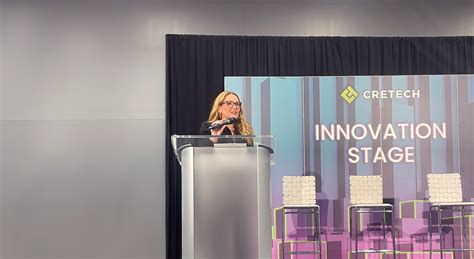The Commercial Real Estate (CRE) Tech Conference has been a premier event for industry professionals to learn about the latest trends, technologies, and innovations shaping the future of commercial real estate. The conference brings together experts, innovators, and thought leaders to share insights, experiences, and best practices in the industry. Here are the top 5 takeaways from the CRE Tech Conference:
The Evolution of PropTech and Its Impact on CRE
The term PropTech has been increasingly used in the commercial real estate industry to describe the intersection of property and technology. PropTech encompasses a broad range of technologies, from data analytics and artificial intelligence to the Internet of Things (IoT) and cybersecurity. The CRE Tech Conference highlighted the growing importance of PropTech in the industry, with experts emphasizing its potential to transform the way commercial real estate is bought, sold, managed, and operated.

Keynote speakers at the conference discussed how PropTech is revolutionizing the commercial real estate landscape, enabling companies to make more informed decisions, streamline operations, and enhance customer experiences. For instance, data analytics platforms can help property managers and owners optimize energy consumption, predict maintenance needs, and identify new revenue streams.
The Rise of Smart Buildings and Their Impact on Occupant Experience
Smart buildings were a major focus at the CRE Tech Conference, with experts discussing the latest trends, technologies, and innovations in the field. Smart buildings utilize advanced technologies, such as IoT sensors, data analytics, and AI, to create more efficient, sustainable, and occupant-centric spaces. The conference highlighted the growing demand for smart buildings, driven by the need for improved energy efficiency, enhanced occupant experience, and increased property value.

Keynote speakers emphasized the importance of prioritizing occupant experience in smart building design and operation. This includes incorporating features such as natural light, air quality monitoring, and personalized comfort controls to create healthier, more productive work environments.
Cybersecurity in Commercial Real Estate: Threats, Challenges, and Solutions
Cybersecurity was a pressing concern at the CRE Tech Conference, with experts discussing the growing threats and challenges facing the commercial real estate industry. As buildings become increasingly connected and reliant on technology, they are also becoming more vulnerable to cyber attacks. The conference highlighted the need for greater awareness, education, and investment in cybersecurity measures to protect commercial real estate assets.

Keynote speakers emphasized the importance of implementing robust cybersecurity measures, such as multi-factor authentication, regular software updates, and employee training programs. They also highlighted the need for greater collaboration and information sharing between industry stakeholders to stay ahead of emerging threats.
The Impact of Emerging Technologies on Commercial Real Estate
Emerging technologies, such as artificial intelligence, blockchain, and virtual reality, were a major focus at the CRE Tech Conference. Experts discussed the potential applications and implications of these technologies in commercial real estate, from enhancing property management and operations to creating new business models and revenue streams.

Keynote speakers highlighted the potential of AI to transform commercial real estate, from predictive maintenance and energy optimization to personalized marketing and tenant engagement. They also discussed the potential of blockchain to enhance transparency, security, and efficiency in commercial real estate transactions.
The Future of Work and Its Impact on Commercial Real Estate
The future of work was a major theme at the CRE Tech Conference, with experts discussing the evolving nature of work and its implications for commercial real estate. The conference highlighted the growing demand for flexible, collaborative, and amenity-rich workspaces that support the needs of modern workers.

Keynote speakers emphasized the importance of prioritizing occupant experience, flexibility, and sustainability in commercial real estate development and operation. They also highlighted the need for greater investment in technologies that support the future of work, such as virtual and augmented reality, AI-powered collaboration tools, and smart building systems.
In conclusion, the CRE Tech Conference provided valuable insights into the latest trends, technologies, and innovations shaping the future of commercial real estate. From the evolution of PropTech to the rise of smart buildings, cybersecurity threats, emerging technologies, and the future of work, the conference highlighted the need for greater awareness, education, and investment in these areas to stay ahead of the curve.
We hope you found these takeaways informative and insightful. Share your thoughts and experiences on the future of commercial real estate in the comments section below. Don't forget to share this article with your network to spread the knowledge.
Gallery of Commercial Real Estate Technologies






What is PropTech, and how is it changing the commercial real estate industry?
+PropTech, short for property technology, refers to the intersection of property and technology. It encompasses a broad range of technologies, from data analytics and artificial intelligence to the Internet of Things (IoT) and cybersecurity. PropTech is transforming the commercial real estate industry by enabling companies to make more informed decisions, streamline operations, and enhance customer experiences.
What are smart buildings, and how do they impact occupant experience?
+Smart buildings utilize advanced technologies, such as IoT sensors, data analytics, and AI, to create more efficient, sustainable, and occupant-centric spaces. Smart buildings prioritize occupant experience, incorporating features such as natural light, air quality monitoring, and personalized comfort controls to create healthier, more productive work environments.
What are the most significant cybersecurity threats facing the commercial real estate industry?
+The commercial real estate industry faces a range of cybersecurity threats, including phishing attacks, ransomware, and IoT vulnerabilities. To mitigate these threats, companies should implement robust cybersecurity measures, such as multi-factor authentication, regular software updates, and employee training programs.
